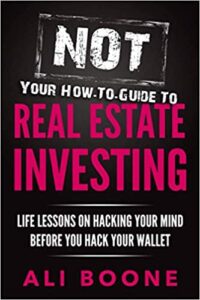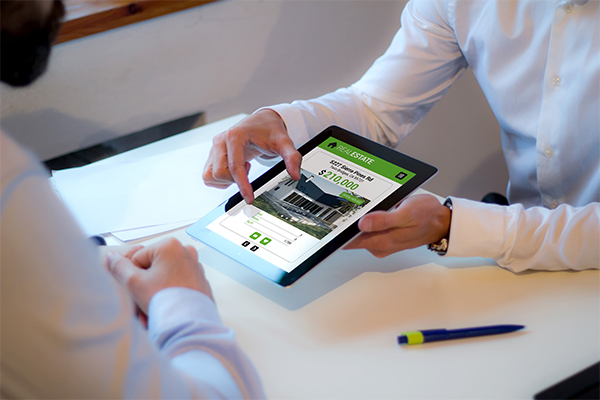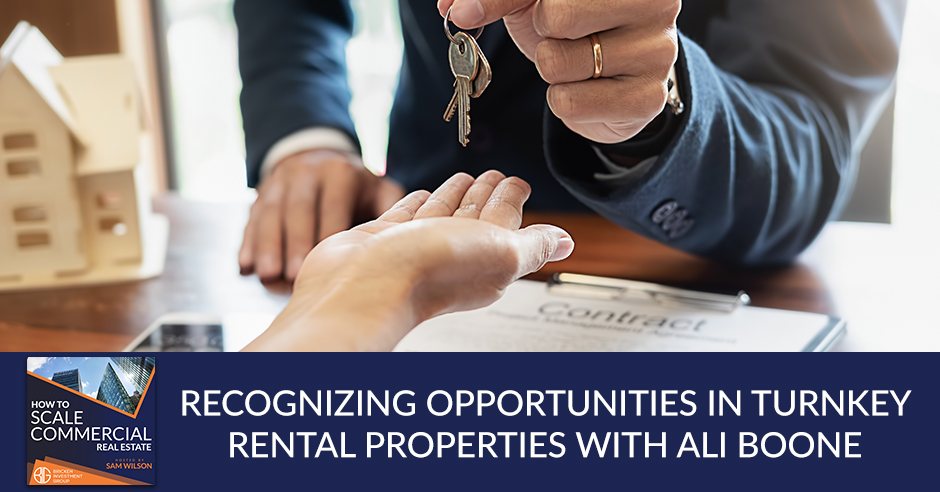There are a lot of opportunities in real estate right now and turnkey rental properties are one of the hottest property classes you can check out. Ali Boone thrives in this space. Ali is an entrepreneur, real estate investor, coach and the founder of Hipster Investments. Joining Sam Wilson on the show, she shares how she got out of her nine-to-five job to achieve freedom by starting a business. She also discusses the ups and downs in doing straight turnkey and how you could succeed in your business venture too. Grab this opportunity and tune in to learn the fundamentals in turnkey rental properties, setting your priorities, analyzing deals, and more.
—
Listen to the podcast here:
Recognizing Opportunities In Turnkey Rental Properties With Ali Boone
Ali Boone is formerly an Aerospace Engineer. She’s an entrepreneur, a real estate investor, author and real estate investing coach. After leaving her [9:00] to [5:00] to pursue ultimate freedom through entrepreneurship, her company Hipster Investments managed to facilitate over $18 million in real estate transactions in its first five years.
She’s a long-time writer for BiggerPockets, has been featured on The Motley Fool, Fox Business, Business Insider, Investopedia and US News. She also authored NOT Your How-To Guide To Real Estate Investing: Life Lessons for Hacking Your Mind Before You Hack Your Wallet. Outside of real estate, Ali also teaches flying and can often be found snowboarding or volunteering in prisons. Her ultimate goal is to one day challenge Tim Ferriss to a lifestyle design duel. Ali, welcome to the show.
Thanks for having me. I’m excited to be here.
The pleasure is mine. The same question I ask everybody who comes to the show is, where did you start? Where are you now? How did you get there?
I started with the typical mindset like in Western society. “Go to school, get good grades, get a good job, get job security, retire when you’re 65, end of the story.” I started there but I tell the story all the time of I went to school, I got a Master’s degree, then I got my first big girl job. Before I ever even sat down in my first cubicle, I turned the corner into the cubicle and I was like, “Uh-oh.” I knew it was not going to be the thing at all. I was like, “I got to get out of here.” I hadn’t even sat down yet. I’m like, “I’m glad I went through 8 or 9 years of school.”
I spent the next five years in my corporate job trying to find a way out. I didn’t know what that was going to be. Was I going to start a business? Was it going to be real estate investing? Those seem to be the two things that get people out of corporate but I was like, “I don’t care what it is. Get me out of here.” It took five years. I wasn’t even planning on real estate but while I was still there and trying to find my way out, some real estate opportunities, because I was looking into everything, hit my desk. I was like, “While I still have a paycheck, while I’m still here and I qualify for mortgages, maybe I should do something smart with my money.”
I started investing in turnkey rental properties. I never heard of the concept. I didn’t know what it was but I was like, “Hands-off, tell me more.” I looked at the flipping and different things. They weren’t quite my thing but turnkeys showed up. I started buying those for myself. I got to practice with creative financing. I did all this and suddenly, everybody wanted to know what I was buying because they’re like, “You bought a property. You don’t have to put work into and it’s 2,200 miles away from you. Tell me more.”
I started telling everyone casually about this and suddenly, I became this go-to turnkey like, “Who are you buying it through? What are you buying? How are you doing that?” It built a business. I started talking to so many people and over the years, I’ve done a lot with turnkeys. It’s a little on the low inventory side, if you want to call it that but over those years too, I took on a lot of business consulting and real estate coaching. I’m doing more of that because of where the market is and all that. That’s how I got here.
Turnkey has been the main product that you have worked inside of then turned that into by opening your mouth and talking to people around the business coaching side of that.
I have a lot more control over my mouth than I do turnkey providers. I’m like, “It’s nice not to have to deal with all these people for a minute.” I’m in charge.
What have been some ups and downs in doing straight turnkey?
Turnkeys are funny because, in theory, they’re not completely hands-off but they’re about as hands-off as you can get for an old property, which is great but there’s also this expectation then that you can be completely hands-off and brains off. A lot of my job in working with other people is like, “Don’t trust everything that comes on your desk.”

NOT Your How-To Guide To Real Estate Investing: Life Lessons for Hacking Your Mind Before You Hack Your Wallet
In a perfect world, this would be a perfect equation. Everything would show up on your doorstep as advertise. It doesn’t usually work like that. My theory is if there are humans involved, there’s room for error. I would say my absolute number one biggest low point is the turnkey providers themselves. You’re putting in a lot of trusts, but they’re doing all the work for you.
The thing would turnkey providers, God bless them, and there are a couple of exceptions to this, but for the most part, they are so good at what they do, which is finding these distressed properties and rehabbing the properties. They’re technically oriented. That’s great because they’re giving us the product that we need but my experience has been because they’re such technical people, so often the customer service communication, that bigger picture interaction type of those skills shoot me.
In my position, I’m connecting buyers with these turnkey providers and sometimes, if the turnkey providers start slacking and then the buyer is stressed out, I’m stuck in the middle. I can’t make anyone do anything. Quite easily, the turnkey providers themselves have been the most frustrating part of the whole thing but, at least for me, the most rewarding thing is watching people get rental properties.
With turnkeys, a lot of times, it’s people who may not have invested, otherwise. I was one of those people. A lot of these people buying turnkeys don’t want to flip a property. They’re never going to flip a property. They have all these reasons why they may not otherwise get into real estate. Getting to watch them get something, get the education and learn about it is rewarding for me and makes me excited until the turnkey providers start stressing them out, then there’s that up and down dip you were talking about.
Sitting on this side of the microphone look at commercial assets, scaling and growing. I think about turnkey and I’m like, “That’s probably the last place I would go.” Not that there’s a thing for everybody because there’s a lot of middlemen. There is generally disalignment of interest between the turnkey provider and the ultimate end buyer. How do you overcome some of that stuff? “They make money on vacancy. We’re going to charge you another month’s rent to stick a new tenant in there. They went 1/12 of the revenue.”
Hands down, the biggest disadvantage turnkeys, as you alluded to, is scaling because if you do your traditional value add deal. You buy a distressed property, put X number of dollars into the rehab and suddenly, you forced appreciation. You’re building, snowballing and compounding your funds. That way, you don’t have your full 20% stuck in that property. With turnkeys because you’re buying them at market value with no way to improve them, you’re putting in 20% down every property. It’s like, “How many 20% downs do we have?”
I’m working on an eBook that is specific on how to scale turnkeys. No doubt about it, that is the biggest downfall but there are certain ways to look at it. If I think of who would be buying turnkeys, there are different reasons for people to buy them. Maybe they don’t even want to scale. They just want to do something smart with their money. Buy a long-term asset, great returns, cool. Another one that I’ve seen thinking about this commercial thing is turnkeys, in my opinion, can be such a good entry point to real estate.
If there are humans involved, there’s room for error.
Just because you start with a turnkey does not mean you have to stick with it forever. I’ve seen many people get 1, 2, 3 turnkeys and through that experience, they start networking and meet different people. Suddenly, they’re working directly with the folks doing the property and they are more into the rehabs. They’re working on getting in the commercial stuff. My absolute favorite turnkey provider who is good at customer service has been out of inventory since October 2020 but he does a lot of commercial stuff. He’s my one provider where if somebody wants a commercial deal and maybe a rehab deal forced that appreciation, he could do commercial.
It’s the idea of using it as an entry point to get you further along. Think about it. If you start with a sixteen-unit distressed Shacki apartment complex as your very first investment, you’re taking on a lot and turnkeys give you a chance. All the hard stuff is done for you so it gives you a chance to learn the absolute basic fundamentals. How to analyze deals? How to run the numbers? How to do due diligence? How to look at all those different components? If you take the time and get a property or two to learn all that, then think about what you can do with that sixteen-unit apartment building.
As a starting point, it can be a little bit harder. It can certainly work but it can be a little bit harder. There are different ways, specifically scaling with turnkeys like our creative financing options. I know a guy who creatively financed twelve turnkeys. It’s more challenging than other strategies. As we’re talking a little bit more about commercial, looking at it as a stepping stone, you’re not tied to it for the rest of your life. It’s a great entry to set yourself up for the best chance of success with the bigger stuff.
Turnkey providers will send you opportunities. How do you vet the good ones from the bad ones? How do you teach people who are working alongside you to spot those?
There are two parts of due diligence. Figuring out what provider you want to work with and what neighborhoods do this particular provider offer properties in. That’s the big thing. I don’t want some sketchy street that’s going to give me bad tenants, rough numbers and all that kind of stuff. Granted, this is going to sound like you have to trust what’s coming out of her mouth but you have a chance to verify this later.
It’s like talking to the provider if you say like, “I want to a B plus neighborhood. I’m looking for this and this,” also getting their take on what’s your experience has been in terms of the different neighborhoods. “If there are three properties I’m looking at, what are the differences? What can I expect with each one? Let’s see which ones fit.”

Turnkey Rental Properties: Turnkey providers are technically oriented, good at finding these distressed properties, and then turning them great.
They’re good about giving the information. I’ve never known a turnkey provider to give false information. The first step is talking to the people. What their focus is if they only operate in D neighborhoods versus B plus or what we’re working with. The nice thing about turnkey, especially even for the new investors, is that you don’t have to figure out everything. It’s like, “What neighborhood do I want to buy? What market do I want to buy in? What are all the numbers? How do I know what’s good?”
My theory is to listen to what the provider tells you what’s good. When you start to select a property and you narrow it down, then you have the chance to verify everything. It’s like, “I know what he told me. Let’s check and see.” There are so many ways to do due diligence on the numbers. Make sure that the numbers make sense. You can do things like rent facts, pro reports.
There are so many ways to get confirmation numbers and confirmation of the neighborhood quality. We can’t predict everything. I’ve got a big document full of due diligence things that you can do to set yourself up. It’s that two-part thing. The thing with turnkeys is you’re not likely local. You aren’t taking someone’s word for it but also understanding that you have the chance to verify what they told you.
How do you make money? I know you present these opportunities to potential buyers, but how does that transaction take place? How do you get paid in this deal?
The great part for the buyers is I’m free for them. They don’t pay me anything to help them. I make the referral fee from the provider and everybody’s first question is, “If they’re paying you a referral fee, I’m probably paying more for the house.” You even mentioned the middlemen. If you work directly with a provider, you’re going to pay the exact same price for a property as if I introduce you to that provider. It ends up being the provider to take the hit on their margins to pay me the referral fee, which is great because then the buyer gets added help, which is me, for free. We’re all winning.
It’s also a help to the provider because I can help qualify people that I send to them. I’m a filter for them and I can do that customer service role for them. God bless, they need help on that. We all win with that equation and it’s been great. There’s a lot of working with a turnkey provider on that, whereas coaching and consulting when I do that, that’s my project. I don’t have to worry about who’s in the equation. It’s a more direct thing.
In a perfect world, everything would show up on your doorstep as advertised. It doesn’t usually work like that.
You worked five years in your cubicle. This has been the one and single exit that you’ve taken.
It was years ago when I left corporate. It was a year before I left corporate that I started investing and then maybe about 6 or 8 months that I was building. I was like, “Do I have something here?” BiggerPockets have reached out. They said, “Do you want to write for us?” I was like, “Okay.” I was trying to build it as much as I could. It was as organic and graceful as jumping ship and hoping to God you have a parachute on. It can be.
Let’s shift gears a little bit and talk about some mindset stuff. You played rugby in college. You are a pilot. You’re also a certified flight instructor. You even did some banner towing, a hilarious and awesome short down in Miami. You’re an avid outdoorsman and snowboarder, all those fun things. A lot of these have some similarities, especially rugby and being a pilot. What has been some of those things in both playing sports and having very exacting disciplines such as flying taught you about mindset?
Flying is funny. You know this because you fly. Everything you do as a pilot is on a checklist. If you have your normal checklist and if something happens, you go to a different checklist. Every single thing has a checklist. It’s not that flying taught me what mindset I want to have. It tell me what mindset I don’t want to have. I went to flight school with a whole bunch of guys. We were all great friends. Three of us moved down to Miami. We went to banner tow. I’ve been around my pilot guy friends for a very long time.

Turnkey Rental Properties: There are many ways to get confirmation numbers, confirmation of the neighborhood quality. We can’t predict everything.
One of my absolute best friends became my investor partner. We’re still great friends. He was dating a girl. We were snowboarding. Long story short, she was learning how to snowboard. Him being the pilot, there’s a checklist of how you can most efficiently learn how to snowboard. You do this, learn this and do that. She could have cared less about the order of things. She strapped her snowboard on and went down the mountain. She was having the time of her life. His pilot brain was freaking out. I’m watching these students. They were having some strain. I was like, “What is going on?” Watching this made me realize how pilots operate in the cockpit. They operate in life.
There’s an order and checklist of things. If something goes wrong, you go to another checklist, then if there’s not a checklist for this thing in life, they’re like, “What do I do?” I never carried the cockpit outside of the airplane, which you can probably tell because I left corporate for real estate and hope that parachute was going to open. I did not do a checklist type of life thing but even at the very beginning of the episode, when you said, “Tell me about yourself there,” that was almost a checklist. Go to school, get good grades, go to college, get a secure job and retire when you’re 65.
Things like rugby, snowboarding, all of that, all of those are outside of the checklist. How I’ve always lived is outside of the checklist of who cares what is supposed to be next? There’s not supposed to anyway. All those shoulds, the things we should do. I love when people say, “You should get all over yourself.” A big mindset in all regards, real estate, entrepreneurship, life, everything is how to not get stuck on that checklist.
The checklist is phenomenal and critical for the airplane. Outside of that, it’s not. It’s like finding those different places where that mentality works versus learning to adjust your mentality for whatever it is you’re trying to accomplish. People trying to get out of corporate. There’s no checklist for that. You got to strap on a little bit of confidence and figured it out. Flying showed me the opposite of mindset learning.
Turnkeys are about as hands-off as you can get for an old property.
Tell me about how that has helped define success for you than not working on a checklist.
It’s funny because I’m like, “I’m answering all of these questions with the opposite.” I even told the story in my book. I remember there was a time when I woke up. I was thirteen years old and I thought, “I want to make a lot of money when I’m older.” It wasn’t for pretentious reasons or anything other than a self-challenge. Here I am, little Ms. Brainiac. I’m like, “I’m going to figure this out. This will be fun. It’s a challenge.”
If I had followed a checklist mentality, there would have been a very linear way to get to make a lot of money. When I left my corporate job, suddenly I woke up in my house and I’m like, “I’ve been out here on my own. I have nowhere to be. I don’t know where my income’s coming in. Uh-oh.” For someone who was an engineer and a pilot, which is controlling like, “I can control the airplane. I can control engineering. I can control the numbers,” suddenly, I didn’t have a lot of control if any.

Turnkey Rental Properties: Adapting that non-checklist mindset contributes more because you are able to analyze and assess your goals every step of the way.
That propelled this non-checklist mentality. I’ve been an entrepreneur for years. I would probably argue that had I followed the checklist mentality, I could probably be making a gajillion dollars. I could figure that out. I could be a multimillionaire but through this little journey and deviating from a checklist, suddenly the money is not as important.
I bet I could have been one of those Shark Tank entrepreneur, investor people. They always tell the story of, “I worked sixteen-hour days for ten years.” I probably could have been doing that over the ten years too but there are a lot of things I liked doing instead like sleeping in. I always stay up-to-date on my soap opera. I like to disappear and go snowboarding for a couple of days. I occasionally do a Netflix binge. Those things are not on any entrepreneur’s checklist. I can promise you.
Adapting that non-checklist mindset contributes more than anything to this idea of what is our actual goals? We’re talking about real estate. Think about financial freedom. People always say they want financial freedom. What is financial freedom? Isn’t it more like time freedom? Nobody cares about financial freedom if you think about it, maybe but most people don’t. It’s like, “I want to be able to live like I’m retired. Do what I want whenever I want to do it. Go anywhere.” That’s what financial freedom gives. If the focus is not financial freedom, it’s time freedom. “How do I free myself in different ways?”
The biggest play is that complete reprioritizing from what my thirteen-year-old self who’s saying, “I want a lot of money. Do I though? I also want to sleep in.” That plays a big role in one of the chapters in my book. I swear this is not straight from my book but I have a theory that there are three true currencies, money, time and sanity. For me, where turnkeys come in, everything I do in real estate and entrepreneurship, I’m always looking at those three things.
If I want to get something, I’m going to pay for that thing in one or more of those currencies, money, time and sanity. Are turnkeys the most financially profitable things? No, not even a little bit. However, my time and sanity usually stay intact, whereas I’m not a natural rehabber or a flipper. To me, it’s not worth losing all my time and sanity to get a little extra money. That’s where the non-checklist mentality comes in for me. It’s that whole reprioritizing, what it is we’re trying to get and how we’re going to get it.
Who have been or what have been some influences and maybe guides along the way for you that have helped shape some of this worldview?
When you start with a turnkey, it does not mean you have to stick with it forever.
Probably nobody obvious. I’ve had to figure out my own worldview. One of my favorite quotes is, “Don’t take advice from someone you wouldn’t trade shoes with.” One of the things that I found to be challenging is who am I supposed to listen to on all the advice? Everyone’s like, “Go flip a house. Go wholesale.” I’m like, “I don’t know.”
The biggest influence, which people reading aren’t going to know, probably is a real estate guy. When I started investing, I met him to sit down and talk about the investments he was working on. He’s the one who eventually introduced me to turnkeys. When I met this guy, I showed up at this little real estate contract. I was expecting him to have a briefcase and all that kind of stuff. I meet him on a rooftop pool deck in Downtown Los Angeles. He’s in khaki shorts, flip flops, no briefcase and no notebook. He had gotten back from traveling to some country. It was a Tuesday.
I was looking at him like, “How are you doing this?” This was when I had my corporate job. He was living the life I wanted. I was like, “I want my own schedule. I want to be in flip-flops on a rooftop pool deck on a Tuesday and get back from whatever country.” I completely ignored the contract and I was like, “Tell me more.” Had I never met him, I don’t think I would have the life that I do because first of all, I didn’t know what was possible but then he became my mentor for the next 5, 6 years. He had already traversed that path and I was like, “I’m following your path.”
It’s hard to learn real estate. We didn’t learn it in school. There’s so much out there. We don’t know who’s telling us what. If some dude sit behind a desk [9:00] to [5:00] wearing a suit trying to tell me about lifestyle design, I’m like, “You don’t have any.” For me, it’s been more of those one-on-one people. I know this is unhelpful to everyone reading because it’s like, “Who do I look at?” More than the celebrities and the known people, for me, it’s finding the people who are demonstrating well. I did say Tim Ferriss. I read The 4-Hour Workweek and that played a big role in this whole thing. It’s finding people who jive with what it is I’m trying to accomplish and focusing on their information.
That is helpful information because those are questions that people ask all the time. “Where do I go? How do I learn? How do I train? What can I do to shift the way I think about X, Y or Z?” You’re giving actionable steps there. Ali, this has been a good time. We are, unfortunately, out of time. Is there anything else that you would like to add to our readers before we jump into the final four questions?
I did set up a link for your readers to get a free digital copy of the book. There is a link on there. You can get it on Amazon if you’re like me and you have to physically hold the book. My company’s name is Hipster Investments. It’s HipsterInvestments.com/ScaleCommercial. If you go there, you can put in your information and get a free copy. I always awe you that much if I’ve been sitting here pitching my book.
The first question for you is this. If I gave you $20,000 to invest in real estate, you had no previous real estate investing experience, what would you do with it and why?
I’d have to put it towards education first. We all got in real estate like, “I want a property. I want it now.” First of all, $20,000 is not going to get you a heck of a lot and the market’s crazy. It’s like, “What better way to spend some of your money?” That is not an invitation to do a $20,000 guru or seminar. I’m thinking smaller scale here. I know that’s boring.
Everybody wants to get into that property but I’m telling you, if you’ll take some time to learn some basic things, we’re not talking years’ worth of education here but basic education, you will be set up for life. If you skip that part, it’s going to be rocky. That’s why there’s a big dropout rate in real estate. I would use that money towards education while also trying to save more on top of it.
You say there’s a big dropout rate in real estate. I’ve never in my life given that concept of thought.
That’s why you’re still here.
Not even me quitting. I’m thinking in general. I didn’t realize that a lot of people get in and get back out.
Even more accurate, it may even be that they technically don’t get in. I don’t know when you were getting into real estate but for me, it’s like I open up how to be a real estate investor. This is what motivated me to write the book. It’s like, “How do we slow this down?” I deal with information overload. It’s not that it’s all hard. It’s just tricky because there’s so much.
I feel like people quite often want to do it and then they can’t get their funding or they start into it. I’ve heard people all the time that dive into some property and they’re like, “Do you think it’s a good deal?” I’m like, “Do you?” They’re like, “I guess.” They don’t know what they’re looking at just because you don’t know what you don’t know. There is a lot of room there for some unnecessary dropouts. I don’t want people to drop out. I want everyone to be in real estate if they want to be.
Question number two for you is this. If you could help our readers avoid one mistake in real estate, what would it be and how would you avoid it?

Turnkey Rental Properties: Don’t listen to everybody because there are a lot of voices screaming out what you should be doing and be cognizant.
Hands down, taking advice from someone you would not trade shoes with. Part of that deciphering sifting information is don’t listen to everybody because there are a lot of voices screaming out what you should be doing. Be very cognizant. With a lot of the big platforms, there are not necessarily checks and balances as far as what people are telling you.
Keep that little inner voice and guidance because that’s how you’re going to become successful. You have to do it your own way anyway. Watch out for two reasons. 1) Information overload and 2) Taking advice from someone who has a completely different skillset from you, a completely different perspective, and completely different goals.
Number three, when it comes to investing in the world, what’s one thing you’re doing to make the world a better place?
That goes back to my volunteering in prisons. It’s my favorite thing. I like working with a lot of people in prison. If not, the majority have been told. They’re worthless. They’re going to die in prison. They’re the scum of the earth. It’s to get in there and meet these people. There are always exceptions to the rule but in most cases, that’s not true. They’re humans like the rest of us. Giving that light of hope to them where usually they don’t have access to. If I could change the world from the prisons inside out, done.
Last question, if our readers want to get in touch with you, what is the best way to do that?
Go to that link HipsterInvestments.com/ScaleCommercial. Put your info there and you’ll get all my contact information. You can reach out. I love talking to people. Even if you could care less about turnkeys or whatever, reach out and say hi. I love meeting everybody.
Ali, thank you for your time. I do appreciate it.
Thank you.
Important Links:
- Hipster Investments
- BiggerPockets
- NOT Your How-To Guide To Real Estate Investing: Life Lessons for Hacking Your Mind Before You Hack Your Wallet
- The 4-Hour Workweek
- HipsterInvestments.com/ScaleCommercial
About Ali Boone
 Formerly an Aerospace Engineer, Ali Boone is an entrepreneur, real estate investor, author and real estate investing coach. After leaving her 9-to-5 to pursue ultimate freedom through entrepreneurship, her company Hipster Investments managed to facilitate over $18M in real estate transactions in its first five years of business. She was a long-time writer for BiggerPockets and has been featured in the Motley Fool, Fox Business, Business Insider, Investopedia, and US News.
Formerly an Aerospace Engineer, Ali Boone is an entrepreneur, real estate investor, author and real estate investing coach. After leaving her 9-to-5 to pursue ultimate freedom through entrepreneurship, her company Hipster Investments managed to facilitate over $18M in real estate transactions in its first five years of business. She was a long-time writer for BiggerPockets and has been featured in the Motley Fool, Fox Business, Business Insider, Investopedia, and US News.
She recently authored NOT Your How-To Guide to Real Estate Investing: Life Lessons for Hacking Your Mind Before You Hack Your Wallet. Outside of real estate, Ali also teaches flying and can often be found snowboarding or volunteering in prisons. Her ultimate goal is to one day challenge Tim Ferriss to a lifestyle design duel.




0 Comments